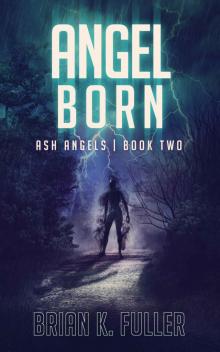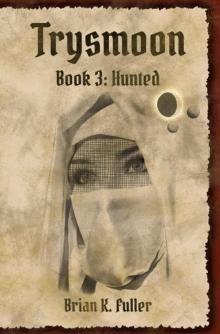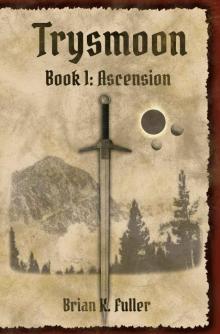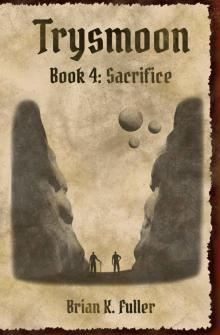- Home
- Brian Fuller
Trysmoon Book 1: Ascension (The Trysmoon Saga)
Trysmoon Book 1: Ascension (The Trysmoon Saga) Read online
Trysmoon
Book One: Ascension
By
Brian K. Fuller
Trysmoon
BOOK One: Ascension
Copyright © 2014 by Brian K. Fuller
All rights reserved, including the right to reproduce this book, or portion thereof, in any form.
Edited by Jessica Robbins [email protected]
Revision 12/12/2014
briankfullerbooks.com
facebook.com/briankfullerbooks
ISBN-13: 978-1502732019
ISBN-10: 1502732017
For Alexandrea and Charlie, my first fans.
Thank you for being a part of my real world
and enjoying my fake ones.
Prologue
Knight Marshall Voss Ethelion stood on a sandy embankment with his back to the sea. An evening breeze rushed past him, cooling the sweat on the back of his neck. The ocean’s gusty breath strengthened and headed inland, dissipating the fog of war just enough for him to see the moon Trys, now but a sliver, hanging low above the tree line with its companion moons, Myn and Duam.
Voss kept one hand on his sword and with the other fingered the three training stones around his neck, stones that had made him a warrior without peer—a warrior with a sacred purpose that had failed. The Church of the One had commissioned him to find and protect the man and woman prophesied to bring god back into the world, but it was too late. The prophecy had failed and the moon was eclipsing, signaling the end of all things. Death had come for the world, and he and his weary men waited for it now.
The humid wind carried the reek of the corpse-strewn battlefield into the dense forest before them. They had sheltered in the trees and held strong against their enemies for nearly a month. But as every fortress and hiding place had before, their defenses did not last. For two weeks, the enemy had driven the Knight Marshall’s army through the dense wood until at last there was no land left between advancing death and the restless sea.
Refugees from the countless cities they had passed through on their retreat lined the beach behind them, huddling around fires and comforting each other with empty words. Voss glanced back at his wife, who cradled his five-year-old son in her lap. He had said some of those empty words himself. Months of brutal defeat had extinguished their hope for survival. Voss and his men no longer fought for the cause of victory or under the banner of any country; they fought to visit what revenge they could upon a relentless foe and to die before witnessing the monsters tear through their ranks and kill those they loved.
They had held the beachhead for two days, and if they survived the inevitable evening assault, it would be three.
“I think I hear them,” whispered Captain York standing to his left.
Voss squinted and attuned his ears. Uyumaak were hard to see in the daytime, much more so in their hiding places in the creaking, shadowy boles at evening. Voss most often heard the enemy advance before he saw them.
His soldiers shifted nervously, hands on weapons, standing as quietly as men in armor can manage to catch any sign of attackers they could feel but not yet see. To a man they were dirty and bloody, armor dented and mismatched, veterans all. Voss commanded them at their request. Few of the senior officers of Rhugoth had survived the slaughter as the armies of men scattered in every direction, ragged and routed.
The hissing of arrows filled the air.
“Get behind the embankment!” he yelled, but too late to spare at least fifteen men dropped by the keen eyes and heavy longbows of Uyumaak Archers just out of sight in the foliage. Voss’s men had killed most of the enemy’s archers a week ago in daytime raids just for the purpose of preventing such attacks. Since then only the lanky, athletic Warriors and squat Bashers had faced them in their daily skirmishes.
The return of the Archers implied a grim reality: the armies of Mikkik were being reinforced. Voss considered the Uyumaak Archers the deadliest of that race’s kind. Their master bred them to pull bows no human or elf could draw, and the long, heavy arrows ripped through horses and thick armor with savage efficiency. The Knight Marshall had watched Archers dismantle more than one cavalry charge to a horse before the knights who rode them could advance halfway across the field.
Arrows streaked close overhead to keep them trapped behind the embankment, and as he expected, the sound of thrashing branches rose above the din as the Uyumaak Bashers and Warriors raced out of their cover in the woods. Voss held his hand up, waiting for the rumble of footfalls to approach more closely; he didn’t want to order his men over the embankment too prematurely to be butchered by the Archers. Nor did he want to move too late and lose the advantage of their crude fortification. But as abruptly as the charge from the forest had started, it stopped. No arrows. No charging feet.
What trick is this? Perhaps they wish to lure us over to be meat for the bows.
The Uyumaak thumped their chests or the nearby trees in their strange, staccato language. Bewildered, Voss ascended the embankment and peeked over. To a creature, the Uyumaak stood in the clearing between the wood and the beach. Their backs were turned toward their human enemies, and their multi-eyed faces watched the sky. They slapped themselves furiously, heedless of the men behind them. Voss saw an advantage. If they could fall upon them while they were distracted, they might just survive the day. He turned toward his men to order an advance, but they, too, had cast their eyes to the heavens.
Voss followed their gaze to the sky. The moon Trys had completely eclipsed, the sign given for the end of the world. A deep rumbling and shaking threw Voss backward down the embankment. The ground heaved, and the screaming of his people joined the thumping of their enemies until a deep rending sound drowned out every other noise. The earth on the other side of the embankment tore away, hurtling into space. Blue sky faded, instantly dissolving to reveal a mass of swirling stars and enormous shards of their shattering world careening through the void.
Voss struggled to his hands and knees, trying to crawl to the beach and his family, only to be thrown down by an overpowering vertigo. He could not get his bearing to stand, stomach roiling. The training stones had not prepared him for this.
As the noise of the ground wrenching apart ceased, the moans of pain, cries of terror, and fits of retching swelled into a cacophony of agony. Voss could find strength to do nothing but stare into the ever-changing sky, the stars and shards of the world dancing as if to celebrate the end. Was this his fault? Had he not been diligent enough in his search for the holy mother and father?
Voss waited for death, but the shuddering beneath him ceased. The stars and shards stopped wheeling, and the sun, which had entirely disappeared, rose in the west, soaring backward across the sky. It slowed its course and stopped, resuming its slow pace back toward the western horizon. At once the vertigo ceased.
Voss rose carefully to his feet, his soldiers and their families struggling to stand as they stared around in wonder. Legs churning, he ascended the earthen embankment and stopped in awe at its summit. The Uyumaak, the forest, and the land they defended for three days had vanished. At his feet a chasm dropped an impossible distance into an inky black space filled with stars and chunks of land—some mere rocks, others as large as a country—floating in a loose ring around the sun.
Most of the shards were too far away to be glimpsed in detail, a distant caravan of a broken world. Voss’s wife and son came to his side and he pulled them close. The world had ended, but they were not dead and did not sleep. The moon Trys, the seat of their dead God’s power, had eclipsed, but something had robbed the anticipated destruction of its total victory.
Those that could brave the vertigo ca
me to the edge, wonder and hope beaming from their dirty faces. The Uyumaak had fallen into the void. Voss’s heart pounded, free of the constricting dread that had followed him for months. If he and his army had survived the shattering, then surely others had as well.
His son tugged at his chain mail shirt, eyes wide with wonder. “Can we go home now, father?”
Voss tousled his hair. Their home was floating around in the shards out there somewhere. “We’ll see,” Voss said.
He tucked the training stones under his shirt. The army would rest for now, but his mission was not over. The world had not ended. The holy mother and father might still be out there or yet to be born. If he couldn’t find them before death found him, he would pass the stones to another.
Then, one day, maybe the world would be whole again.
Chapter 1 - White Sticks
“I wish you wouldn’t play that abominable game, Gen! You can ill afford to break a finger so near the end of your apprenticeship.”
Gen smiled at Rafael. His old master’s wispy gray hair and skeletal face always evoked a strange mixture of humor and pity in whomever he addressed, but Gen’s long association with Rafael lent him an immunity to the bard’s pathetic entreaties.
“Have you looked outside? Do you really think I’m going to stay. . .”
“Not to mention,” Rafael interrupted, raising his voice, “the misfortune of losing an eye or getting a huge scar on your forehead! I’ve not known one successful bard with a scarred face or missing body parts. Save what good looks you have, lad! You certainly don’t have a surplus to squander on a silly game!”
Gen grabbed his cloak, hurrying to get in as much recreation as possible. Autumn in Tell rarely offered a day as beautiful as the one that beckoned to him now. While Gen knew that Rafael, as his master, had every right to order him to stay indoors, he rarely chose to issue such demands. Gen’s own desire to excel at his craft and the affection that existed between him and Rafael obviated any need for rigid strictures. However, even if the old bard did order him to stay inside, Gen thought he might just disobey.
Harvest Festival had ended the day before, and no one had worked harder than he and Rafael. Magistrate Showles demanded they perform and sing so much during the week-long celebration that afterward Gen genuinely felt sick of playing music and telling stories, an exhaustion he had never felt during all his years of apprenticeship.
What he needed now was mindless, brutal fun with young men of half his intelligence, one-fourth his breeding, and one-tenth his vocabulary. The sons of woodsmen provided just such entertainment. While they could certainly break his arms and knees with ease, he could make them look like idiots with equal facility. Half the time they didn’t even know they were being sported with.
But Gen did possess two redeeming qualities to aid him in physical games. He was tall and he was fast. Most peasants in the Kingdom of Tolnor were short, stocky, and of a dark complexion. Gen, in contrast, stood a head taller than most of his peers in Tell and had a fair complexion, light-brown hair, and green eyes. Rafael, who was himself from Rhugoth, told Gen that he looked Rhugothian, though in the larger cities of Tolnor there was a greater variety of peoples than were found in the country dukedom of Duke Norshwal of Graytower.
Gen opened the door of the two-story farmhouse that he and his master occupied alone in what the townspeople called “a shameful waste of a big house.” Rafael, a freeman, had bought the seven room home from Baron Forthrickeshire and had proceeded to fill it with belongings acquired from a lifetime of travel, brought in on wagons from several origins. Gen dared only once to ask Rafael why a bard of his obvious attainments and property chose a remote town to live out the remainder of his days. The hurt look in Rafael’s eyes and his terse reply that it was “none of his concern” held enough emotion to persuade Gen to abandon the subject forever.
With a wave to his frowning master, Gen bounded down the porch’s three steps and into the brisk afternoon wind. High clouds moved quickly over the tall trees of the Alewine Forest to the west, hinting at a change in the weather that, thankfully, had remained clear and sunny during the Harvest Festival.
As he walked, Gen tied his shoulder-length brown hair into a ponytail to keep it from interfering with his vision during the game. Rafael’s concern for his pupil’s health was not unfounded. While White Sticks most often resulted in only minor bruises, Edmunson, the town farrier, lost an eye to the game in his youth, and Gen’s friend Gant broke his forearm, an injury that threatened to end his apprenticeship as a woodsman.
While Gant’s wound did heal satisfactorily thanks to the ministrations of Pureman Millershim, Gant’s master strictly forbade him from playing the game ever again. Of course, the prohibition hadn’t stopped Gant at all, and his master knew it. If anything, Gant treated the game with even more reckless abandon than before, and for the last two years whatever Ministrants presided over the game of White Sticks blessed Gant plentifully. Gen thought Gant’s run at White Sticks legendary, but he suspected that his friend excelled at it because he had such a high incentive not to get hurt. His master would undoubtedly punish him harshly for another injury, and Gant loved his master’s daughter, Yeurile.
Gant waited for Gen where the Green Road intersected with the small lane that ran into the forest. Gant was less stout than his peers, while still possessing the powerful frame, and his brown hair had just a hint of red in it. He stood with his thumbs hooked under the frayed rope that held his pants up, face happy at the sight of his friend and with the anticipation of an afternoon of sport. The country boy’s smile jutted up and down like a tortured mountain range, lending his countenance a ridiculousness and innocence.
“Gant,” Gen greeted cheerily. “A fine day for White Sticks!”
“Yep,” he replied, falling in beside Gen, “though I ‘spect the wind’ll play tough with the throws. You ready for the Showles’ boys?”
“You arranged a game with Jakes and Howen? How did you manage that? Those two won’t come within forty feet of a peasant. I believe they think peasantry is a disease they might catch. Jakes actually puts a cloth over his mouth when he has to talk to me.”
“You might be the clever one an’ all, Gen,” Gant answered, “but I know how to place a barb under a saddle. After we won ‘gainst Derk and Gover, I let it drop in places I knew it would get ‘round that you said it was just as well that Jakes didn’t never play ‘gainst us since he throws like a girl.”
“Wonderful,” Gen said. “I don’t think they hate me quite enough yet.”
“I always like t’ help when I can. But not to fear. There’ll be plenty others about. I’d wager we’ll only have a few rounds to knock ‘em around a bit and then we’ll let some of the other boys peck at ‘em. Just thank Eldaloth that Hubert ain’t here. Dumb as an ox, but I hear he can throw like a Gagon.”
Hubert Showles, the eldest son of Magistrate Showles, was a lumbering brute of a young man who, despite his violent temper and absurd behavior, was his father’s favorite and spoiled accordingly. By some extremely fortuitous arrangement of his father’s, the boy managed to secure a position in Duke Norshwal’s contingent of foot soldiers. Everyone, his own brothers included, celebrated his departure.
“I bet yer hopin’ for a certain young lady to see yer performance today.”
“It is not necessary for you to bring her up every time we get together, Gant,” Gen returned glumly.
“Oh, c’mon, Gen. You like her. Yer about the marryin’ age. Fess up!”
“Of course I like her, you dolt. Doesn’t everybody? I suspect you do too, despite whatever feelings you have for Yeurile.”
“‘Nah,” Gant rebutted as he picked at the callouses of his palms. “Regina’s too uppity fer me. You two were made fer each other. You’re both as pale as birch and use words no mouth within fifty leagues of here has any right sayin’.”
“She’s a freeman, Gant. It’s going to take me years to earn enough money to purchase that status.”
“How long’d it take Rafael?”
“Ten years. But he was better than I am and played in Rhugoth where it is more lucrative.”
Gen wasn’t sure if Gant knew what lucrative meant, but a gathering of young folk ahead of them drew their attention back to the impending game. Gen eyed the crowd expectantly, disappointed to find Regina missing but surprised at the number of people there, nonetheless. Jakes and Howen obviously invited everyone they could find. They stood in the center of the throng, a large leather bag propped up against Jakes’s leg.
Jakes and Howen, stoop-shouldered twins, appeared to be putting on a little girth. Like their father, shockingly red hair and small eyes punctuated bland, puffy faces. Jakes and Howen had every one of their older brother’s deficiencies of character but in addition possessed a sullen meanness cultivated from living with a boorish favorite their entire lives. In the realm of stupidity and brash behavior, they were crowned kings. Gen avoided them as often as possible, though he did take some delight in abusing them to their faces without them knowing it.
“Jakes, Howen, or Howen, Jakes,” Gen greeted brightly, “I’m not sure that bag is big enough to hold all your ignominy.” From the blank stares all around, Gen knew he was alone in understanding the sentence.
“It is too big enough,” Jakes returned crossly. “We didn’t want to play with your stupid sticks, so we got our pa to get us a real set with real Uyumaak bones!”
Jakes turned the bag over dramatically and the White Sticks fell out, everyone pressing in for a better look. By the sound of the sticks knocking against one another, Gen knew immediately the set was not fashioned from bones at all, but from some hardwood carved to look like them. Sets of real Uyumaak bones were very hard to come by and extremely expensive. Uyumaak, the principal soldiers sent against the nations during the Mikkikian wars, were considered all but extinct by most.

 Angel Born
Angel Born Hunted (Book 3)
Hunted (Book 3) Dread Uprising
Dread Uprising A Mystery of Light
A Mystery of Light Trysmoon Book 1: Ascension (The Trysmoon Saga)
Trysmoon Book 1: Ascension (The Trysmoon Saga) Sacrifice (Book 4)
Sacrifice (Book 4)